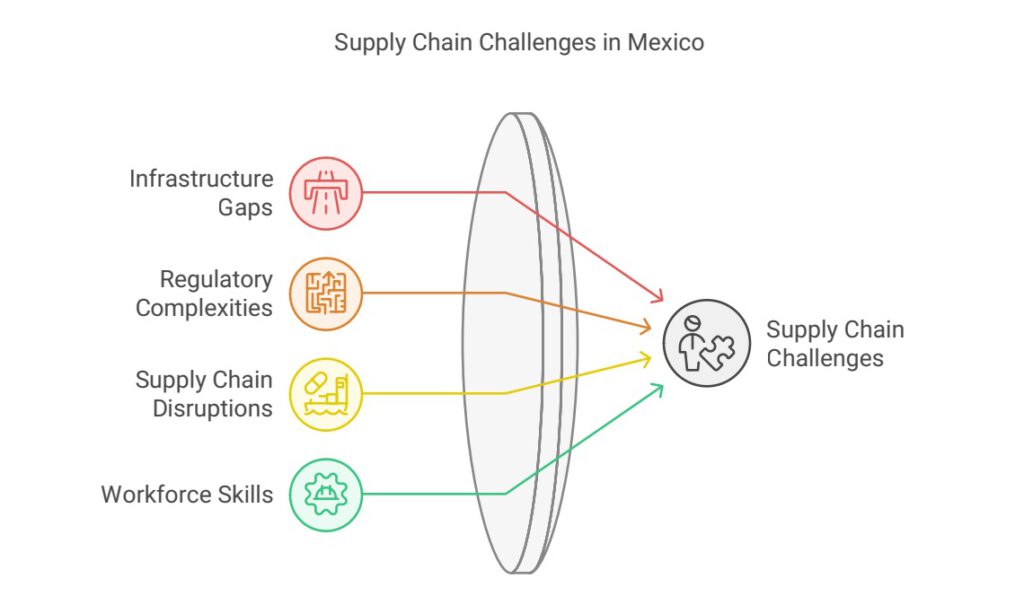Last Updated on October 22, 2024

Mexico has emerged as a global manufacturing powerhouse, particularly in industries such as automotive, electronics, and aerospace. With its proximity to the U.S., favorable trade agreements, and competitive labor costs, Mexico offers compelling opportunities for companies looking to optimize their supply chain operations. However, to fully leverage Mexico's manufacturing sector, it’s crucial to adopt strategies that ensure long-term supply chain efficiency and resilience. In this article, we will explore proven strategies for optimizing Mexico's manufacturing and strengthening your supply chain.
Leveraging Mexico’s Trade Agreements and Free Trade Zones
Mexico’s strategic trade agreements, most notably the USMCA (United States-Mexico-Canada Agreement), offer manufacturers significant cost savings. Additionally, free trade zones and maquiladoras allow companies to import raw materials and components duty-free as long as finished products are exported.
Strategy: Take full advantage of Mexico's trade agreements to minimize tariff costs and streamline logistics. This includes understanding the USMCA origin rules to ensure compliance and avoid unnecessary duties.
Nearshoring for Increased Supply Chain Resilience
The COVID-19 pandemic and ongoing global disruptions have shown the vulnerability of long, complex supply chains. Nearshoring, or relocating production closer to end markets, provides the flexibility needed to respond quickly to disruptions. Mexico’s proximity to the U.S. allows companies to shorten lead times and reduce transportation costs compared to Asian-based supply chains.
Strategy: Shift more manufacturing and sourcing to Mexico to mitigate risks associated with overseas suppliers, while improving response time and reducing shipping delays costs.
Streamlining Cross-Border Logistics
Cross-border transportation can be one of the most challenging aspects of manufacturing in Mexico, particularly with the congestion often experienced at the U.S.-Mexico border. Efficient customs processing, robust communication between suppliers and freight forwarders, and real-time tracking technology can make cross-border logistics much more efficient.
Strategy: Partner with logistics providers experienced in cross-border trade, utilize customs brokers, and invest in software that facilitates real-time visibility of shipments to ensure a smoother supply chain process.
Developing Local Supplier Networks
While Mexico offers an extensive manufacturing base, developing relationships with local suppliers can reduce costs and improve supply chain responsiveness. Sourcing from regional vendors cuts down on transportation costs and lead times, while also promoting stronger collaboration with suppliers for product development and innovation.
Strategy: Invest in local supplier relationships and conduct regular supplier audits to ensure quality and compliance with your manufacturing standards. Additionally, working with local suppliers provides flexibility in scaling production to meet demand shifts.
Investing in Workforce Development
Skilled workforces are essential for high-quality manufacturing. Mexico supports several industries with government-backed training programs that prepare workers for advanced manufacturing roles. Additionally, ongoing training and development initiatives for the workforce will improve productivity and reduce operational errors.
Strategy: Establish partnerships with local technical schools and invest in training programs to upskill workers, particularly for roles in advanced manufacturing technologies such as automation and robotics.
Incorporating Technology and Automation
Automation and digital technologies, such as Industry 4.0, transform supply chains. Mexico invests in smart factories, data analytics, and IoT. These can streamline production processes and improve supply chain transparency. Automation can also reduce labor costs in certain areas while maintaining production quality and consistency.
Strategy: Implement automation solutions in key manufacturing processes and use data analytics to monitor and optimize supply chain performance. By integrating these technologies, companies can reduce waste, improve forecasting, and respond to market changes faster.
Over the past 12 years, Mexico’s digital transformation has been guided by key government initiatives aimed at enhancing digital infrastructure and promoting inclusivity. The National Digital Strategy (Estrategia Digital Nacional) has been the cornerstone of these efforts, focusing on expanding internet access via the “Internet for All” initiative, improving government services through digitalization, providing guidelines for the acquisition of technologies, and increasing financial inclusion. Elected President Sheinbaum recently announced the creation of the Digital Transformation Agency to streamline government procedures and promote digital government. - International Trade Administration
Sustainability and Corporate Social Responsibility (CSR)
As global consumers demand more sustainable and ethically produced products, companies with Mexican manufacturing operations must incorporate environmental and social governance (ESG) standards into their supply chain strategies. This involves reducing emissions, optimizing energy use, and ensuring labor practices align with international standards.
Strategy: Develop sustainability goals for your Mexican operations, such as reducing energy consumption and waste. Additionally, engage with local communities to support CSR initiatives that align with your company’s values.
Overcoming Common Supply Chain Challenges in Mexico

Mexico, a key player in global manufacturing, offers many opportunities but also faces common supply chain challenges. Overcoming these requires strategic planning:
- Infrastructure Gaps: While major cities have solid logistics networks, rural areas may lack reliable roads and transportation systems. Companies can mitigate this by partnering with local logistics providers and utilizing advanced technology like real-time tracking for better route planning.
- Regulatory Complexities: Mexico's evolving trade regulations can impact supply chains. Staying compliant with customs and tariffs is essential, requiring businesses to work closely with trade experts and stay updated on legal changes.
- Supply Chain Disruptions: Natural disasters and political instability can affect supply chain continuity. Establishing strong supplier relationships, diversifying sources, and implementing contingency plans help businesses remain resilient during unexpected events.
- Workforce Skills: A lack of specialized skills in some regions may affect production quality and efficiency. Companies can invest in workforce development through training programs to ensure a skilled and reliable labor pool.
Conclusion
In today's fast-paced manufacturing landscape, effective long-term supply chain strategies are crucial for success. By adopting a long-term perspective and implementing proven strategies, manufacturers can optimize their Mexico operations, reduce costs, and improve competitiveness. Reassess your supply chain strategy today and discover the benefits of manufacturing in Mexico.
Frequently Asked Questions: Long-Term Supply Chain Strategies
What are the primary benefits of nearshoring in Mexico?
Nearshoring in Mexico offers several benefits, including reduced transportation costs and lead times, improved quality control, and increased flexibility. Mexico's proximity to the US market and shared time zones facilitate communication and collaboration.
How can manufacturers mitigate supply chain risks in Mexico?
Manufacturers can mitigate supply chain risks in Mexico by implementing risk management strategies, such as diversifying suppliers, investing in logistics infrastructure, and developing contingency plans for potential disruptions.
What are the key infrastructure challenges facing manufacturers in Mexico?
Key infrastructure challenges in Mexico include inadequate transportation networks, limited port capacity, and unreliable energy supplies. Manufacturers can address these challenges by partnering with logistics providers, investing in alternative energy sources, and advocating for infrastructure development.
How do labor laws and regulations impact manufacturing operations in Mexico?
Labor laws and regulations in Mexico require manufacturers to comply with standards for wages, benefits, and working conditions. Manufacturers must also consider regulations related to employee training, safety, and union relations.
What role does technology play in optimizing supply chain operations in Mexico?
Technology plays a critical role in optimizing supply chain operations in Mexico by enabling real-time monitoring, predictive analytics, and automation. Investments in technologies like IoT, AI, and robotics can enhance efficiency, productivity, and quality control.
Explore More: Discover Related Blog Posts
Expand your knowledge and delve deeper into more information about Mexico Supply Chain with our curated collection of related blog posts.
- How Mexico Is Strengthening Supply Chains for Long-Term Stability
- How to Find Your Ideal Mexico Manufacturing City
- Is Your Supply Chain Ready for a Mexico Move?
- Mexico’s Customs Clearance: Why It’s Faster—and Smarter—for Manufacturers
- How to Streamline Supply Chains in Mexico Without Losing Your Mind (or Your Margin)
About NovaLink
As a manufacturer in Mexico, NovaLink employs a unique approach that transcends the traditional model of shelter production. More than just the location of your manufacturing, we would like to become a partner in your manufacturing in Mexico. You will be able to relocate or initiate manufacturing for your company in Mexico in a low-cost labor environment with very little delay or up-front costs. Find out how we can help you by handling the manufacturing process.
There are NovaLink facilities in the border cities of Brownsville, Texas, Matamoros, Mexico, and Saltillo, Mexico.